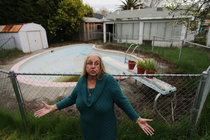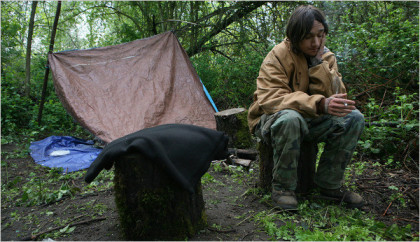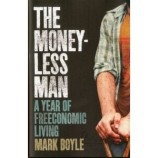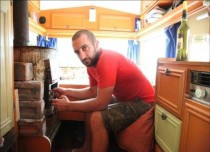Homeless Archives
Archived homeless stories.
Recession Drives Surge in Youth Runaways
Recession Drives Surge in Youth Runaways
The New York Times
by Ian Urbina
October 25, 2009
Running in the Shadows
MEDFORD, Ore. — Dressed in soaked green pajamas, Betty Snyder, 14, huddled under a cold drizzle at the city park as several older boys decided what to do with
her.
Betty said she had run away from home a week earlier after a violent argument with her mother. Shivering and sullen-faced, she vowed that she was not going to sleep by
herself again behind the hedges downtown, where older homeless men and methamphetamine addicts might find her.
The boys were also runaways. But unlike them, Betty said, she had been reported missing to the police. That meant that if the boys let her stay overnight in their hidden
tent encampment by the freeway, they risked being arrested for harboring a fugitive.
"We keep running into this," said one of the boys, Clinton Anchors, 18. Over the past year, he said, he and five other teenagers living together on the streets had taken
under their wings no fewer than 20 children — some as young as 12 — and taught them how to avoid predators and the police, survive the cold and find food.
"We always first try to send them home," said Clinton, who himself ran away from home at 12. "But a lot of times they won’t go, because things are really bad there. We
basically become their new family." Read more
Pro Bono Goes High-Tech, and Homeless Veterans Benefit
ABA Journal Law News Now
by Debra Cassens Weiss
August 5, 2011
Skype can be used to talk to your spouse, catch up with a friend, or talk over a business matter. The
Minnesota Justice Foundation has found another use for the technology—linking low-income people in need of legal help with lawyers who have the expertise to counsel them.
This spring, the foundation used video technology to link homeless veterans in Duluth with volunteer bankruptcy lawyers in Minneapolis. Sara Sommarstrom, program director
of the Minnesota Justice Foundation, explained at an ABA Annual Meeting program Thursday how that was accomplished.
The foundation sent about a dozen volunteer law students from Minneapolis to help homeless veterans in Duluth fill out legal forms for their pro se cases. Two legal aid
lawyers with expertise in family and elder law were there to help.
Also standing by were volunteer bankruptcy lawyers at Faegre & Benson in Minneapolis. The firm had interactive TV, the same technology that is used at courthouses
throughout Minnesota. One vet being chased by debt collectors used the courthouse video system to meet with a Faegre & Benson lawyer. Another used Skype on a law student’s laptop to meet with a lawyer at different firm recruited at the last minute to avoid a conflict of interest.
Sommarstrom says video technology has lots of potential in a state where lawyers and law students are concentrated in just two cities: Minneapolis and St. Paul. Some
rural counties have fewer than 10 lawyers in all, and they can’t provide pro bono help to all the residents who need it. "We have a county that literally has two attorneys," she said.
She spoke at a program called "Lawyering in the Digital Age: Using Technology and Social Media to Assist Underserved Populations." The ABA Division for Public Services
was the primary sponsor.
The Moneyless Man: A Year of Freeconomic Living
The Moneyless Man: A Year of Freeconomic Living
Mark Boyle, author
Imagine a year without spending even a dime. Former businessman Mark Boyle did just that. Following his own strict rules, Mark learned ingenious ways to eliminate his bills and flourish for free. Encountering seasonal foods, solar panels, skill-swapping schemes, cuttlefish toothpaste, and a cash-free Christmas, Boyle puts the fun into frugality and offers some great tips for economical (and environmentally friendly) living. A compelling story, you'll never look at money in the same way again. Read more
The Moneyless Man
Huffington Post
August 28, 2010
In 2008, economics graduate and former businessman Mark Boyle gave up the one resource we all crave more of: money. He sold his house, found a place to live where he
could trade labor directly for accommodation, set up a rocket stove made from discarded catering cans, a solar shower, a veggie garden, and a compost toilet. And on November 28th (International Buy
Nothing Day 2008), he became The Moneyless Man.
In his new book "The Moneyless Man: A Year Of Freeconomic Living," Mark
tells us how he did it and why. He answers practical questions, offers useful tips to cut down daily expenses, and relays the philosophical lessons he learned. What Mark discovered is that not only
could he successfully eliminate his bills and reduce his carbon footprint, but that by living without money he ended up more productive, healthier and happier than ever.
In the slideshow, Mark documents all the challenges and experiences of his moneyless year. For more information about Mark and his book, check out his profile for CNN.
Abandoned storage unit reveals converted apartment
Fox 30 WAWS
February 21, 2011
JACKSONVILLE, Fla. -- Bidding on abandoned storage units is something Melissa Hatcher does all the time.
"A couple times a week I go to different places, and I usually sell whatever I find inside," she told Action News.
Monday seemed like a typical bidding day, when she arrived at Uncle Bob's Self Storage on Lane Avenue. A partial preview of a single unit that was delinquent in payments since October of 2010, didn't
bring any offers. Nonetheless, management went ahead and broke the lock they placed on the unit months ago, and opened the garage door.
"When they opened up the unit it was like a house," Hatcher said, as she remembered the shocking moment.
"There was a front door and walls, and it was all separate rooms with a living room and a bedroom."
A 10x10 unit had been converted into an apartment. The renter of the single unit had knocked out the walls to the three surrounding 10x10 units and made himself a home.
"He painted it so it was like a house, but there was still trash in there, and some food. It wasn't decorated very nice."
Multiple bidders told Action News the kitchen was equipped with a counter and electrical outlets.
"He had a bucket, so I'm assuming that was the bathroom, but that was about it."
It was a surprise that bidders couldn't believe, and left them thankful that noone made a bid.
"I guess it's cheaper then rent," joked Hatcher. No electricity bill or anything."
Company representatives said they've never had a situation this serious before. They are conducting their own investigation and said they do plan to file a report with the Jacksonville Sheriff's
Office. Once that investigation is complete, they plan to donate to charity whatever decorations and furniture can be saved.
Reverse Mortgage pitfalls may leave people homeless
 Isabel Santos says she spends her evenings huddled over stacks of foreclosure notices on her parents’ home. Credit Jim Wilson/The New York Times
Isabel Santos says she spends her evenings huddled over stacks of foreclosure notices on her parents’ home. Credit Jim Wilson/The New York Times
Pitfalls of Reverse Mortgages May Pass to Borrower’s
Heirs
New York Times Dealbook
By Jessica Silver-Greenberg
March 26, 2014
The only solace for Isabel Santos as she spends her evenings huddled over stacks of yellowed foreclosure notices is that her parents are not alive to watch their ranch-style house in Pleasant Hill, Calif., slipping away.
Ms. Santos, 61, along with a growing number of baby boomers, is confronting a bitter inheritance: The same loans that were supposed to help their elderly parents stay in their houses are now pushing their children out. "My dad had nothing when he came here from Cuba and worked so hard to buy this house," Ms. Santos said, her voice quivering.
Similar scenes are being played out throughout an aging America, where the children of elderly borrowers are learning that their parents’ reverse mortgages are now threatening their own inheritances. Reverse mortgages, which allow homeowners 62 and older to borrow money against the value of their homes that need not be paid back until they move out or die, have long posed pitfalls for older borrowers.
Now many like Ms. Santos are discovering that reverse mortgages can also come up with a harsh sting for their heirs.
Under federal rules, survivors are supposed to be offered the option to settle the loan for a percentage of the full amount. Instead, reverse mortgage companies are increasingly threatening to foreclose unless heirs pay the mortgages in full, according to interviews with more than four dozen housing counselors, state regulators and 25 families whose elderly parents took out reverse mortgages.
Some lenders are moving to foreclose just weeks after the borrower dies, many families say. The complaints are echoed by borrowers across the country, according to a review of federal and state court lawsuits against reverse mortgage lenders. Read more



































































































































